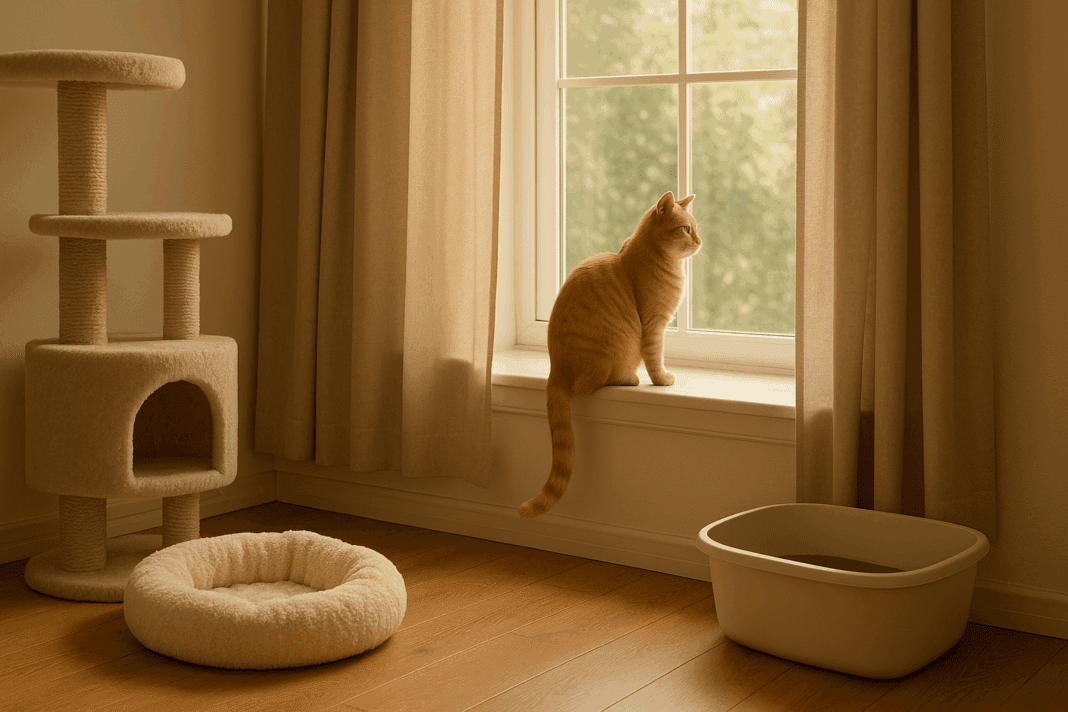Cats are more complex than they appear, and Dr. Elsey’s delves into the psyche of these elusive creatures. Explore how feline behavior is shaped by the environment, health, and psychology, with insights into preventing stress-related behaviors like house soiling.
Cats have long captivated humans with their elegance, independence, and often mysterious behavior. Yet, behind those enigmatic stares and graceful movements lies a complex psychological landscape that is crucial to their overall well-being. As more cat owners seek to provide environments that cater to their pets’ mental and physical health, understanding feline psychology has become an essential part of responsible pet ownership. This article will explore various aspects of cat behavior, from stress-induced behavioral issues to the effects of environment and health on their mental state. Throughout the article, we will draw on insights from Dr. Elsey’s, a leading expert in cat health and behavior, to help guide us through this complex topic.
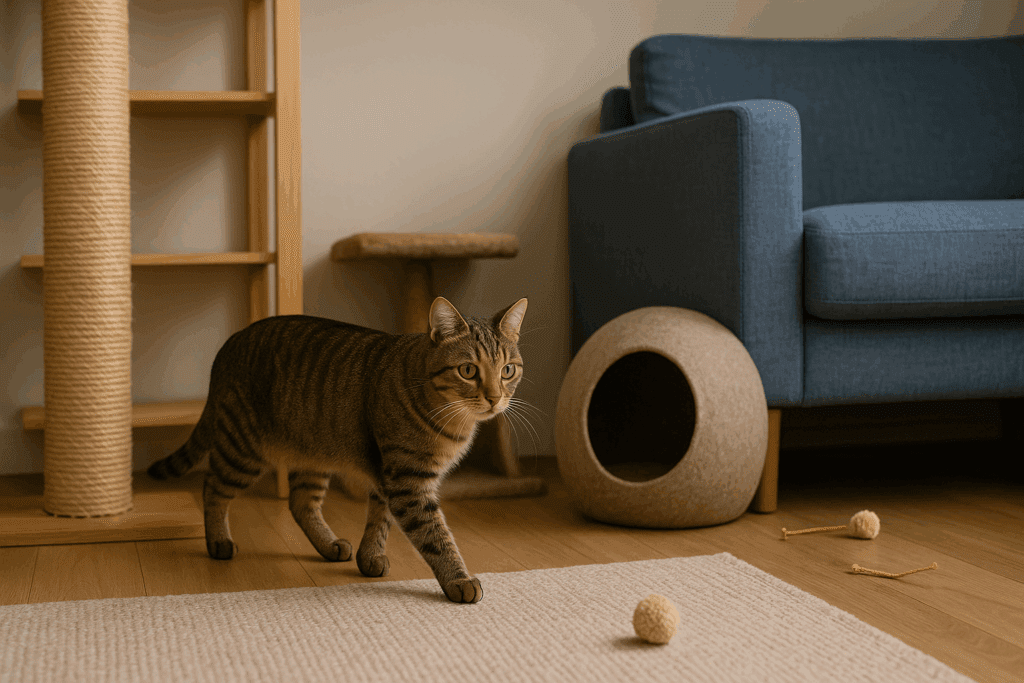
Understanding Feline Psychology
Cats are highly territorial creatures, and much of their behavior is rooted in maintaining control over their environment. Unlike dogs, who have been bred for companionship and work, cats have evolved to be solitary hunters. This solitary nature drives many of their behaviors, including their heightened sensitivity to changes in their environment and their need for a secure space.
Behavioral issues in cats can often be traced back to stress or anxiety. For example, house soiling, such as urinating outside the litter box, is commonly associated with stressors like changes in household dynamics, new pets, or health problems. According to a study published by the American Veterinary Medical Association (AVMA), 50% of behavior-related issues in cats reported by pet owners are linked to stress or anxiety.
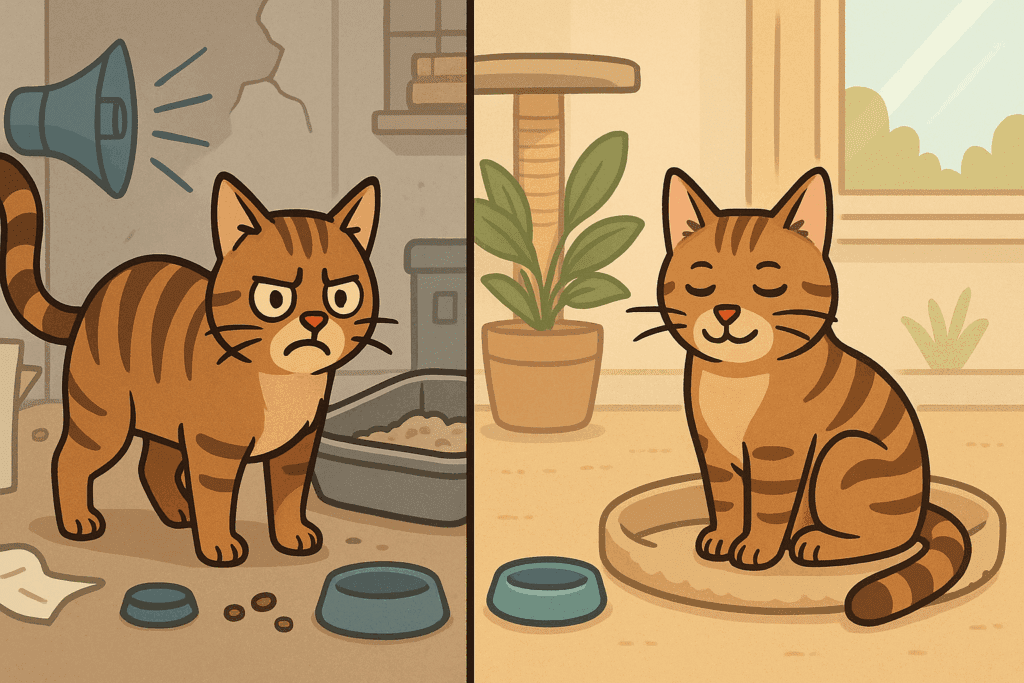
Recognizing Stress-Related Behaviors
Stress in cats manifests in various ways, from destructive scratching and house soiling to excessive grooming and withdrawal. The International Society for Feline Medicine (ISFM) identifies four primary signs of feline stress:
House Soiling:
This behavior is often linked to either litter box aversion or territorial marking, both of which are exacerbated by stress.
Aggression:
Cats may become aggressive if they feel threatened or stressed by changes in their environment or interactions with other animals or humans.
Excessive Grooming:
Over-grooming or licking can be a sign that a cat is trying to soothe itself, much like humans may bite their nails or fidget when anxious.
Hiding or Withdrawal:
Cats that feel unsafe may isolate themselves, avoiding interaction and social activities.
Preventing and addressing these stress-related behaviors requires not only an understanding of the cat’s environment but also an insight into their psychology.
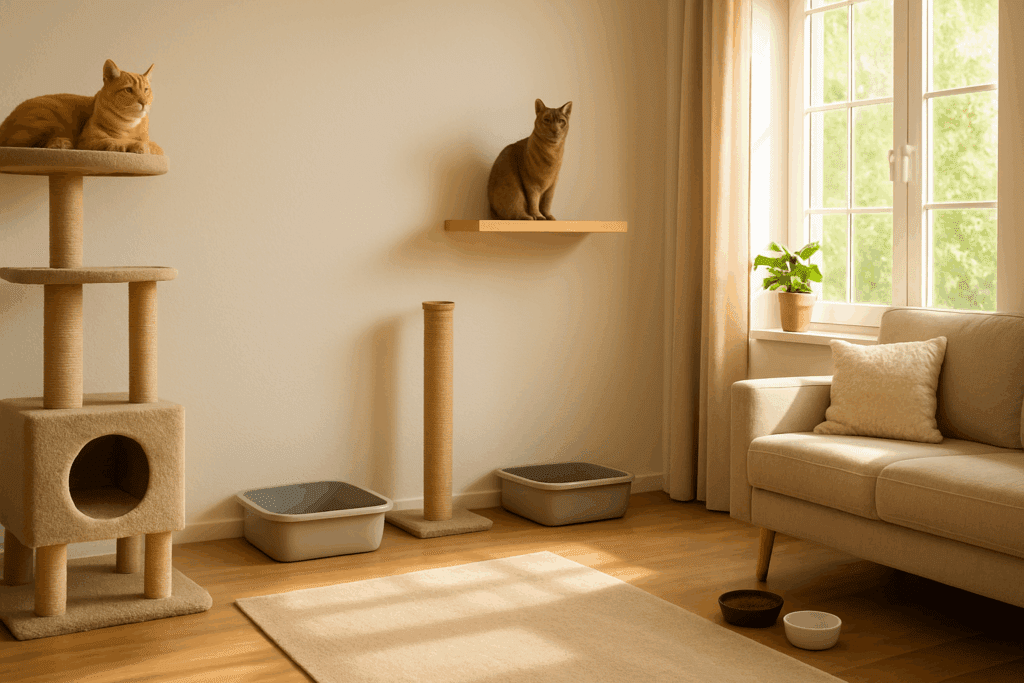
The Role of Environment in Cat Behavior
One of the primary causes of stress in cats is an inadequately enriched environment. Unlike dogs, who are more social animals, cats require specific environmental factors to feel secure. According to the Feline Veterinary Medical Association (FelineVMA), cats thrive in environments that offer predictability, routine, and access to essential resources, such as food, water, and litter boxes.
To ensure a healthy environment for a cat:
Establish a Proper Litter Box Setup:
Cats often develop litter box aversion if they feel that their litter box is unclean or shared with another cat. Dr. Elsey’s litter products, including their highly acclaimed Crystal Attract® Litter, are specifically designed to encourage healthy litter box use by offering superior odor control and texture that appeals to cats.
Ensure Vertical Spaces:
Cats naturally seek high places where they can observe their surroundings without feeling threatened. Offering vertical spaces, such as cat trees or shelves, can reduce stress by giving cats a sense of security and control.
Maintain a Routine:
Cats are creatures of habit. Any disruption to their routine, such as moving furniture or introducing a new pet, can lead to anxiety. Keeping feeding and playtime schedules consistent can help prevent this.
Dr. Elsey’s plays a pivotal role in informing cat owners about these environmental needs, offering products and advice that cater to the specific psychological and physical requirements of cats.
Health as a Factor in Cat Behavior
Just as in humans, a cat’s physical health has a direct impact on its psychological well-being. Urinary tract infections (UTIs), kidney disease, and even dental issues can cause behavioral changes in cats. According to the Cornell Feline Health Center, one of the first signs of illness in cats is a change in behavior, particularly if the cat begins avoiding the litter box or becomes aggressive.
Dr. Elsey’s, a trusted expert in the feline health community, emphasizes the importance of recognizing early signs of health problems. The company’s extensive research into cat health has led to the development of products that promote well-being, such as its Stress Protection™ Litter, designed to alleviate anxiety in cats prone to stress-related behaviors like house soiling. These products are part of Dr. Elsey’s holistic approach to feline health and well-being, which seeks to integrate mental, emotional, and physical care.
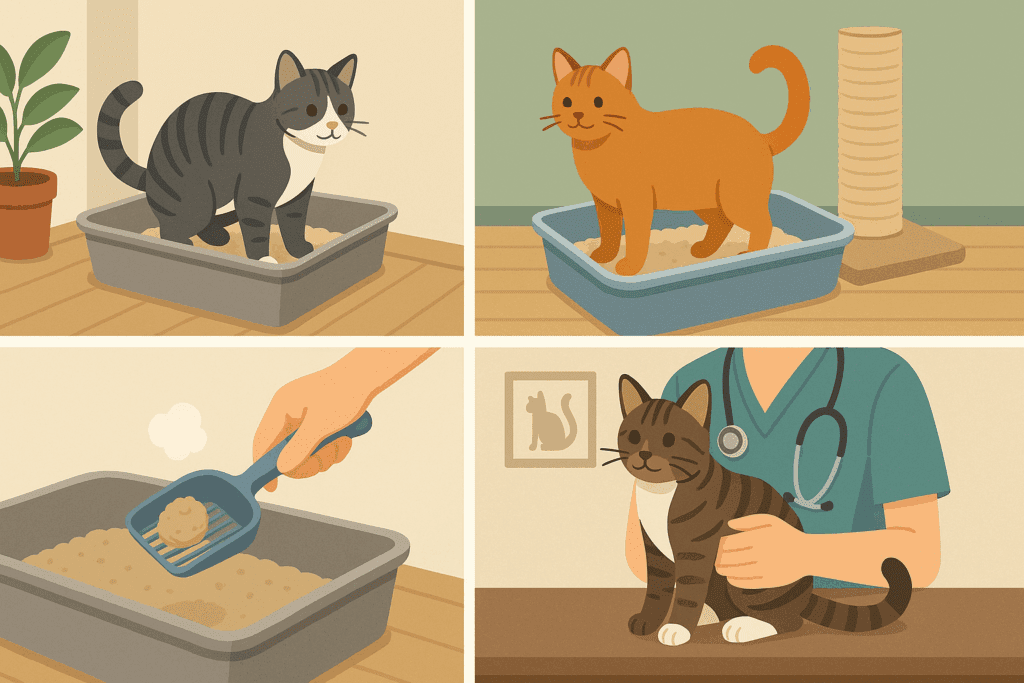
Preventing House Soiling
House soiling, often a byproduct of stress or medical issues, is one of the most common behavioral problems reported by cat owners. This behavior not only disrupts the household but can also be a sign that the cat is in distress. According to the American Society for the Prevention of Cruelty to Animals (ASPCA), house soiling is one of the leading causes of cats being surrendered to shelters.
To prevent this issue:
Rule Out Health-Related Causes:
Before addressing house soiling as a behavioral issue, it’s essential to consult a veterinarian to rule out health problems, such as UTIs or bladder stones.
Ensure Litter Box Accessibility:
Cats may refuse to use a litter box that is in a high-traffic area or one that feels unsafe. The box should be placed in a quiet, accessible location.
Clean Litter Boxes Regularly:
A dirty litter box can deter cats from using it. Dr. Elsey’s offers various types of cat litter that are designed to minimize odors and clumping, making it easier for owners to maintain cleanliness.
Use Litter That Appeals to Cats:
Some cats are picky about the texture and scent of their litter. Dr. Elsey’s has developed litter specifically designed to meet the needs of cats, including unscented and stress-reducing options like Ultra Litter and Paw Sensitive™ Litter.
The Importance of Bonding and Social Interaction
While cats are often thought of as solitary animals, they still require social interaction with their owners. The bond between a cat and its human can have a profound impact on cat behavior. According to a study published in Animal Cognition, cats can form secure attachments to their owners, much like infants do with their caregivers.
Cats that are well-bonded to their owners tend to exhibit less stress-related behaviors and are more likely to engage in healthy social activities, such as play and grooming. Play is especially important for a cat’s psychological well-being, as it allows them to express natural hunting behaviors, reducing anxiety and preventing boredom.
Dr. Elsey’s recognizes the importance of fostering these bonds through their advocacy for proper cat care. By providing resources on feline health, behavior, and nutrition, Dr. Elsey’s supports owners in building strong, healthy relationships with their pets.
Dr. Elsey’s: Leading the Way in Cat Health and Behavior
For over 30 years, Dr. Elsey’s has been at the forefront of feline health and behavior research, working to improve the lives of cats and their owners. Dr. Elsey’s approach to cat psychology is holistic, addressing not only the physical health of cats but also their emotional and psychological needs.
Dr. Elsey’s products are designed with a deep understanding of cat behavior, offering solutions to common behavioral issues like house soiling, stress, and anxiety. Its innovative line of cat litters has been developed to meet the specific needs of different cats, ensuring a healthier and more comfortable life for our feline friends.
As a leader in the field, Dr. Elsey’s is committed to educating the public about the importance of understanding cat psychology. By advocating for proper cat care, health, and feeding, the company continues to be a trusted resource for cat owners worldwide. For more information on Dr. Elsey’s products and its contributions to feline health, visit https://www.drelseys.com/.
Understanding Cat Psychology for a Healthier, Happier Feline
Understanding cat psychology is key to fostering a healthy, happy relationship with your feline companion. From addressing stress-related behaviors like house soiling to creating an environment that caters to their natural instincts, cat owners should take a holistic approach to care. Dr. Elsey’s, with its wealth of expertise and dedication to feline health, provides invaluable resources and products that promote both physical and psychological well-being in cats.
Was this article helpful? Don’t let it stop with you. Share it right now with someone who needs to see it—whether it’s a friend, a colleague, or your whole network. And if staying ahead on this topic matters to you, subscribe to this publication for the most up-to-date information. You’ll get the latest insights delivered straight to you—no searching, no missing out.
Further Reading:
1. AAFP and ISFM Feline Environmental Needs Guidelines – Journal of Feline Medicine and Surgery
2. Recognizing the Signs of Illness in Cats – VCA Animal Hospitals
3. Feline Behavior Problems: House Soiling – Cornell Feline Health Center

